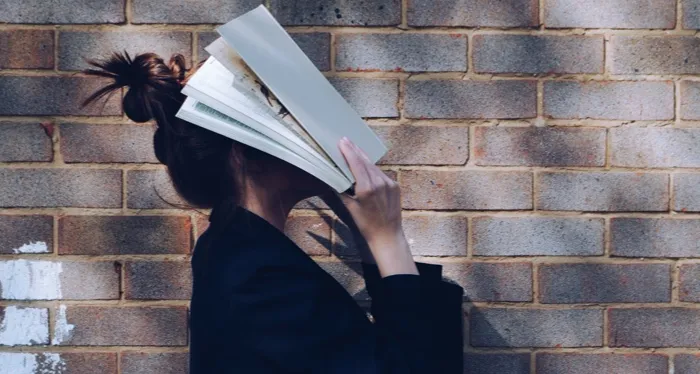
I’m Glad I Don’t Picture Anything When I Read
Close your eyes and picture an apple. Okay, I assume you’ve opened them back up. What color was the apple? What shape was it? How big was it? Was it sitting on something, hanging from a tree branch, floating in the air? Can you rotate it in your mind? Can you picture a bite getting taken out of it?
This is the classic test for aphantasia or “mind blindness.” For people with aphantasia, this is an impossible task. When they close their eyes, they see nothing. A few years ago, James Wallace Harris wrote about realizing he has aphantasia and how that affected his reading life. Since then, I’ve seen a lot more people discussing this phenomena, and particularly how it relates to reading.
I don’t have full aphantasia: I can sometimes picture things — indistinctly, or just for a second before it slips away. I definitely can’t hold a clear, sharp image in my head, though. Often, I find myself trying to picture a thing and instead coming up with words: the apple is red, it’s curved, it has a stem. I’m repeating the descriptors instead of actually “seeing” anything. Whoops.
A lot of people find the idea of aphantasia horrifying. Many people experience the world, their thoughts, and even their reading life primarily visually. Memories are like miniature movies. It’s hard for them to even fathom how I interact with the world. (And, to be fair, my memory is exceptionally bad.)
When it comes to reading, I hear book lovers extol the wonders of being able to imagine rich worlds, populated with detailed characters. That, they claim, is the beauty of reading. It’s why reading is better than movies: because you can cast whoever you want, you have no limits on the special effects, and you’re the director. It’s an experience like no other, they say. But I’ve never experienced it.
I’ve also seen a lot of people with aphantasia (or who are somewhere on that spectrum) regret that they aren’t able to experience books in the same way, that those visuals are out of reach for them. But the truth is…I have no interest in visualizing while I read.
Part of the reason is that I already have a shallow relationship with visuals — which sounds bizarre, I realize. Likely because I can’t hold onto images in my head, I’ve never been a visual artist or drawn to visual media. I love TV shows, but that’s for the characters, the plot, the jokes — not the pictures on the screen. I like watching them, but they fly out of my head as soon as the TV shuts off. When I remember things, I don’t “see” them as much as I feel them. I remember the emotions, with tactile sensations and sounds added on. The hazy visuals I can catch glimpses of are just extras.
Being able to see things as I read feels about as intriguing as smell-o-vision. Sure, baking shows would improve, but it’s not high on my wishlist of features. Besides, all of this hoopla around watching movie versions of books play out in your head fails to take into account the opportunity cost of experiencing books without the visuals.
When I really get into a book — when I’m sunk into the story and not just decoding words — I’m immersed in pure story. The world around me disappears, and I stop consciously registering the words on the page in front of me. I am transported into language and words without any visual form. I feel what the characters are feeling, and I register the impact of the visuals described: I know the the castle is tall, covered in vines, looming over me — err, the character — so although I can’t “see” it, I feel the sense of foreboding, the weight of history, the intrigue.
This, truly, is an experience like no other. It’s magical to be swept along on a story with nothing to anchor you. The world of narrative has different dimensions than the real world, and my senses change with it. I disappear into the words.
To me, the idea of watching a movie in my head cheapens the reading experience. I can watch movies. That’s already a thing that exists. But reading? Reading is a whole different sensation. It’s not swapping out the View-Master slides between this world and another. It’s experiencing someone’s life from the inside and outside at the same time. It’s transcendent. I wouldn’t trade it.









